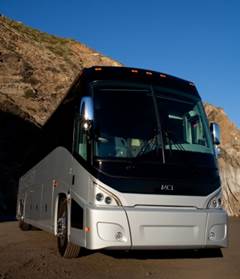
MCI’s J4500 maximizes the lightweight and low cost benefits of RMC’s Portal ™ DCPD molding technology
RMC’s full spread of composite technologies is critical to maintaining OEM profitability in the face of economic uncertainty and offshore, body-on-chassis competitors.
The coach OEM that is prepared to offer an advanced service vehicle that delivers significantly reduced operating and maintenance costs will have a competitive advantage.
Key factors influencing operator purchasing decisions will continue to be: price, durability, serviceability, style, and life-time operating costs.
RMC’s configurable composite technologies are structured to provide the discerning OEM with the tools necessary to meet these acceptance criteria.
VARTM – this second-generation, sandwich-panel processing technology has been upgraded to reduce cost and improve performance. Characterized by low cost tooling, lightweight, and structural potential, it’s more than just a replacement for plywood. Think one-piece, “drop’n’go” no-rot floors with integrated ramp and seat plinths, step wells, or a structural roof (with or without skylights).
RIM DCPD – formerly out of reach of most coach OEMs, continuous process improvement and innovation at RMC has yielded another break through: low cost RIM tooling! Ideal for prototype and short-run moulding of instrument panels, side consoles, access panels, fenders, skirts, radiator and condenser grilles, headlight and taillight bezels utilizing this low cost, impact resistant, class “A” polymer.
RIM Polyurethane – RMC has the capability of moulding competitively priced, impact absorbing bumpers and fenders in solid elastomer, structural, or flexible foam. Finishes range from in-mold primer to class “A” top coat, ready for installation.

